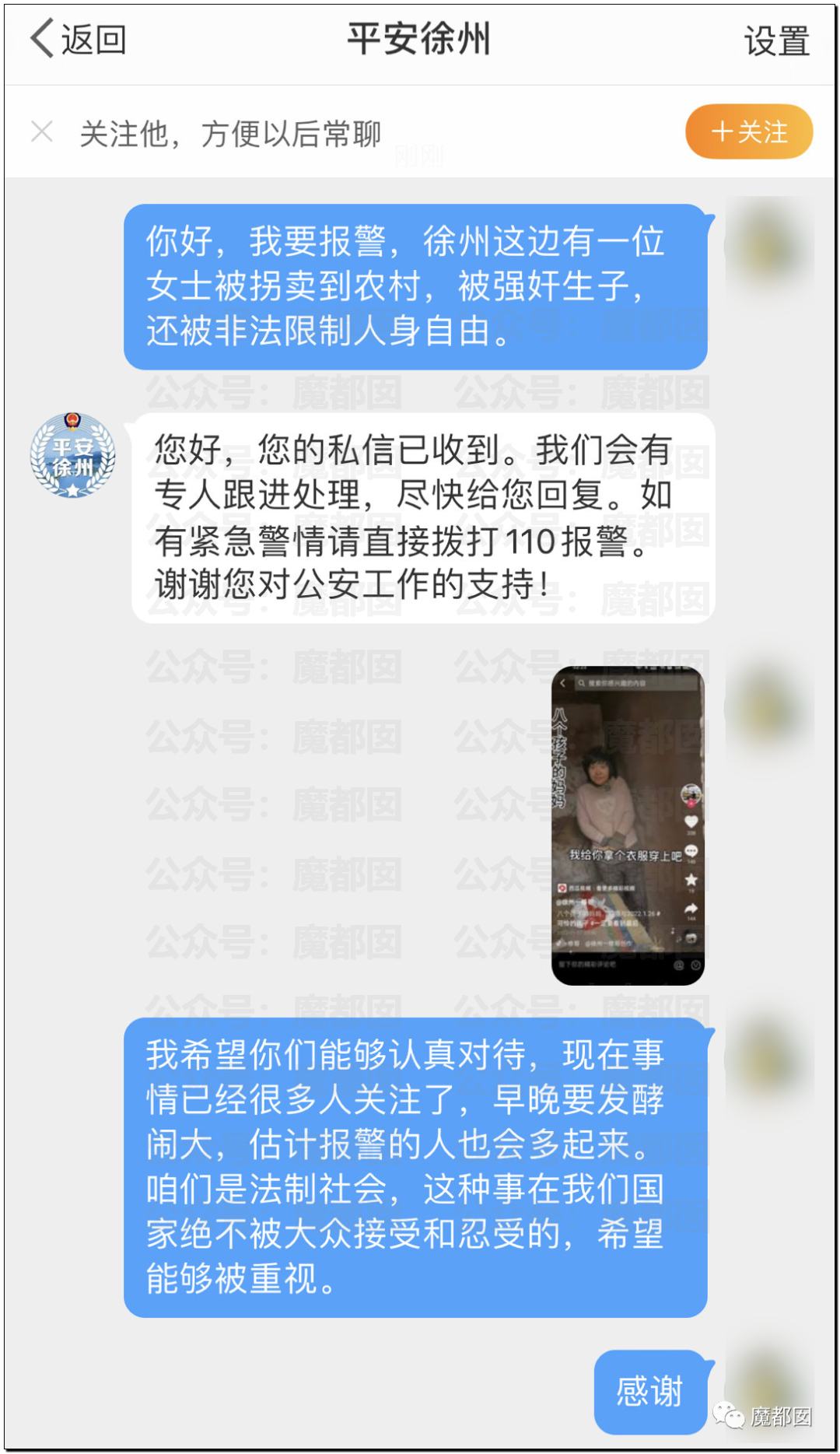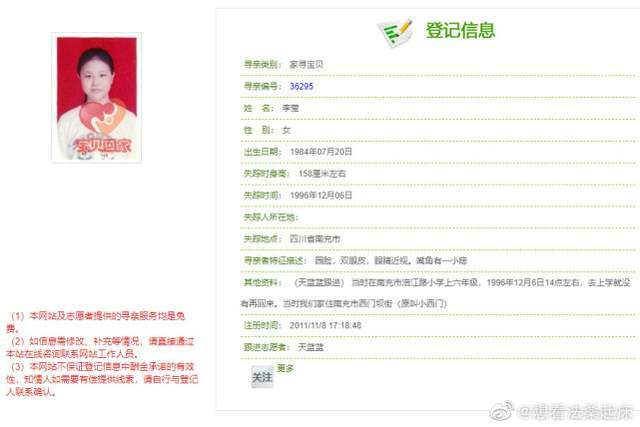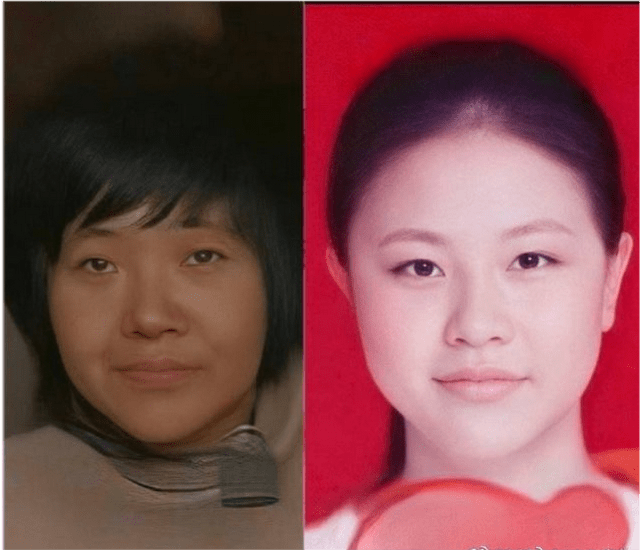A short viral video of a purportedly mentally-ill mother of eight kept chained in an outdoor shed has provoked outrage among Chinese citizens, prompted a criminal investigation, and brought renewed attention to the issues of human trafficking, domestic violence, and treatment of the mentally ill. Comments on Chinese social media have been highly critical of the way that local officials handled the matter, and of censorship of the topic on Weibo and other platforms.
The disturbing video, which first surfaced on TikTok’s Chinese counterpart Douyin, shows a woman with a metal collar and chain around her neck inside a small shed. A male Douyin video blogger (known for posting videos of impoverished families and collecting donations for them from his online fans) repeatedly asks the woman if she is cold, if she needs a coat, and if she understands what he is saying. Although she nods, her answers are unclear, and she seems to be toothless. The video blogger notes the freezing temperatures, and the fact that her bowl of food is frozen, and eventually finds her a coat to wear.
The story has led to a social media storm, with some expressing their anger through art and images. pic.twitter.com/cDRD5km6DQ
— Manya Koetse (@manyapan) January 29, 2022
As originally posted, the video purported to show the “positive energy” of an impoverished father living in a village in Xuzhou, Feng County, Jiangsu Province, and struggling to provide for his mentally-ill wife, eighty-year-old mother, and eight children ranging in age from twenty-three to two years old. The father, Dong Zhimin, had been profiled on social media before, and had received government assistance and numerous charitable donations.
But many viewers immediately dismissed the “positive energy” angle and flooded the comments section with questions about the woman’s inhumane treatment, accusations of human trafficking, theories about her history, and demands to notify the police. An article by Weibo user Mo Dou Nan (魔都囡), republished by CDT Chinese and translated in part below, includes screenshots of the video and a detailed description of the furor that followed:
“People in their village say that when the children’s mother first arrived, she was educated and could speak English. She wasn’t stupid, but her husband beat her senseless, and when she was disobedient, pulled her teeth out.”
“Could she have been trafficked?”
What is even more incredible is that the Douyin vlogger didn’t post the video in the hope that people would report the situation to the police, but as an example of “positive energy”:
“I didn’t report it to the police. You’re taking the wrong approach—my goal was to have the father see these comments and feel pressured into treating his children’s mother, his own wife, more kindly. What are you thinking? If the police come and arrest Dong Zhimin, who will take care of those kids?”
Even more shocking is the fact that, although the whole situation smelled rotten, quite a few people still liked the video:
“It can’t be easy, being both mother and father. If only the kids’ mom weren’t mentally ill.”
“What a thriving family—lovely to have so many children.”
[…] “Things might be a bit difficult now, but when the children are all grown up, they’ll definitely be a big happy family that everyone envies!”
[…] But an even greater number of commenters had questions:
[…] “Why is the mother chained up? Does she have mental problems? If so, why force her to have eight children?”
[…] “That brand new house doesn’t even have a room for the kids’ mother, who’s forced to live in a tiny latrine. This sort of man isn’t worthy of sympathy. I feel sorry for that woman and her kids.”
[…] Many concerned citizens reported it to the police:

Screenshot of an exchange between a citizen and the local police
Citizen: Hello, I want to report a woman in Xuzhou who was trafficked to the countryside, who was raped and gave birth, and who is also having her personal freedom of movement illegally restricted.
Xuzhou Police: Hello, your private message has been received. We will have someone to follow up on it and get back to you as soon as possible. If there is an emergency situation, please dial the police directly at 110. Thank you for supporting the work of your local police!
Citizen: I really hope you will handle this seriously. The situation is getting a lot of attention now, and sooner or later it’s going to blow up—I’m guessing that a lot more people are going to be reporting this to the police. We’re a society ruled by law, and the public isn’t going to stand for this sort of thing happening in our country. I hope you take it seriously.
Citizen: Thank you! [Chinese]
On January 28, the Feng County Communist Party Committee issued an official notice that seemed intended to assuage the public’s concerns:
Situation update regarding netizen reports of “the woman with eight children”
Following reports from netizens regarding “the woman with eight children,” the Feng county government and county committee promptly established a joint investigative team to conduct a thorough investigation. Preliminary findings indicate that the woman reported by netizens is Yang *xia [asterisk indicates the use of a “filler character” to obscure the full name], who legally married Dong *min in Huankou Township, Feng County, in August of 1998. There is no evidence of trafficking. Relatives and neighbors report frequent unprovoked assaults by Yang against children and the elderly. A medical institution diagnosed Yang as suffering from mental illness, for which she is currently receiving treatment. Further assistance is being provided to the family to ensure that they enjoy a warm and festive Lunar New Year. Further investigation into the situation is ongoing.
The Publicity Department of the Feng County Communist Party Committee
January 28, 2022 [Chinese]
The terse official notice provoked even greater fury among Chinese social media users, who demanded more information and action from the authorities:
“Hello, what’s going on with that metal chain? If she’s mentally ill, wouldn’t they call the police and get her transferred to a mental hospital? And what, just because they’re married, he’s allowed to keep her in chains?”
“What’s Yang’s real age? Where is she from? And where are her folks?”
“Who the fuck are you kidding? No evidence of trafficking? Living in a place like that, with eight kids, and he wants more? No evidence of trafficking—you’ve got to be kidding me!”
“Those ‘relatives and neighbors’ are all from that village. We want to hear what her family has to say. When did she first arrive in the village? Is her own family aware of the situation? Was she of sound mind when she got married? Did she do it willingly?”
[…] “If she’s mentally ill, shouldn’t she be examined at a hospital, instead of being shackled and chained? That man wouldn’t have married her if she’d been insane, would he? So how did she become mentally ill? What brought it on? And what about her folks? We demand an explanation!” [Chinese]
Two days later, on January 30, a second official statement was released, under the auspices of the county government. By now, the authorities were already cautioning social media users against “spreading rumors,” and hashtags related to the incident were being censored. In a striking example of “hashtag harmonization,” other hashtags quickly disappeared from social media and only the official hashtag remained (#Official report from Feng County, Xuzhou, on the situation of the woman with eight children# #官方通报徐州丰县生育八孩女子情况#).
The second statement went into more detail:
Investigation of netizen reports about “the woman with eight children”
The county joint investigative team (formed at the behest of the county party committee and county government to look into questions raised by concerned netizens) has conducted investigatory visits with Dong *min and his family members and neighbors, spoken to current and former town and village cadres and other personnel, and consulted relevant archives and materials. The following is an update on the investigation:
Yang *xia (whose name was provided to investigators by her husband Dong *min) was living as a vagrant beggar in the border region between Huankou Township, Jiangsu, and Yutai County, Shandong, when she was found and taken in by Dong *min’s father, Dong *geng (now deceased) in June of 1998, after which she lived with Dong *min. In the process of living together, Yang was discovered to be developmentally disabled, but she was still able to care for herself. When handling the marriage registration process, town civil affairs office personnel did not conduct a rigorous verification of her identity.
In November of 2020, public security organs [law enforcement departments] entered Yang’s DNA into the “National Public Security Information System for Locating Abducted and Trafficked/Missing Children” and the “National Public Security DNA Database” for comparison. Thus far, no matching information has been found. No evidence of trafficking was found during the investigation. Public security organs will continue carrying out an in-depth investigation into Yang’s identity.
Since June of 2021, Yang’s condition has worsened. When her mental illness flares up, she often smashes things and beats her children and elderly family members. In order to prevent his wife from harming others when her illness manifests, Dong temporarily uses shackles and chains to restrain her from this behavior, but removes them after her mental state stabilizes. Dong’s actions are suspected of being in violation of the law, and the police have launched an investigation into him.
On January 30, 2022, after consultation with both city and county experts, Yang was diagnosed with schizophrenia. Expert diagnosis and treatment recommendations are as follows: continue to treat with antipsychotic drugs, and restrain when necessary, to prevent her from impulsively harming herself or others, or from wandering off. Yang is currently receiving in-hospital treatment.
After the birth of the couple’s first and second children, the town family planning department implemented birth control measures, which failed due to physical reasons. Dong has also repeatedly used various methods to evade family planning department oversight and services. Since then, the family planning department has failed to implement timely, effective birth control measures.
Since May 2014, civil affairs, finance and other government departments have provided a minimum living allowance and local medical insurance coverage to Dong’s family. They are given additional subsidies twice annually, at Lunar New Year and the Mid-Autumn Festival. Three of the children receive a living allowance of 750 yuan per semester, and another two children receive a government subsidy of 500 yuan per semester. For many years, the village committee has provided them with subsidies for daily essentials. In 2021, the township government approved a grant of 37,000 yuan to replace the family’s dilapidated home with a newly built, four-bedroom house. The family has also received numerous donations of cash and items from kind-hearted private citizens.
The joint investigative team will conduct an in-depth investigation of the situation at hand, and will deal with any official misconduct or dereliction of duty in accordance with the law. Law enforcement bodies have set up a special task force to investigate possible criminal conduct, and anyone suspected of criminal violations will be dealt with in accordance with the law.
Feng County Joint Investigative Team
January 30, 2022 [Chinese]
Not only did the second official pronouncement fail to mollify concerned citizens, it raised even more questions among the public. Social media users challenged the unsubstantiated “facts” given in the statement, demanded to know more about the woman’s family and whether she was trafficked, and shared posters of Li Ying, a missing girl from Sichuan who bore a striking resemblance to Yang, the shackled woman in Xuzhou. Some urged their fellow citizens to continue paying attention to the woman’s case and to other potential cases of kidnapped/trafficked women and girls. CDT has collected and translated a selection of comments from among the flood of online commentary that ensued:
@一只爱睡觉的安安: No matter how sanitized, the official announcement still contains a fairly large amount of information. There’s solid proof that the woman was homeless, that her identity is unknown, and that she suffers from schizophrenia and a developmental disability; therefore, the marriage was invalid and constitutes rape [due to her inability to consent, according to Chinese law]. There were violations of family planning policy, and dereliction of duty by the local family planning department. There was illegal handling of identity documents, and law enforcement violations by the local public security bureau. Then there are the last few questions [mentioned briefly in the official announcement]: whether it was human trafficking, whether the eight children share the same father, and whether there are any other women in similar situations in the village.
@一-一三 : If you find a cat, you always ask around to find out who lost it. They found a person and took her home to make babies. // @Camille_tournesol: They’ve redefined the term “take in” [a stray]. And can you even get married without proper ID? Think those [local] officials knew they were breaking the law?
[…] @惊鸿如_梦: What kind of times are we living in? I haven’t even seen much follow-up coverage of that “Little Red Mansion” incident [a 2021 sex-trafficking case in Shanghai]. Shouldn’t every single official involved in this case be arrested? Is there child trafficking going on in the village? Who fathered all those children? Have the police ignored past reports about the village? If there’s “no evidence of human trafficking,” then where is this woman’s family? Everyone in that village ought to be investigated and prosecuted! And then there are those [officials] talking all the time about how the birth rate is too low, when they can’t even guarantee the most basic human rights—have more babies, my ass!
@Gregory的主治医师们: Li Ying was born in 1984. In 1996, at the age of 12, Li Ying disappeared. In 1999, Li Ying was 15 years old and gave birth to her eldest son. In 2021, Li Ying will be 37 years old and her eldest son will be 22. The timeline fits.
[…] @巴巴操盘: How can a grown adult just vanish into thin air? Every community and village in the whole country has a local Communist Party branch. The relevant departments should print and distribute missing persons bulletins – or send electronic copies – to every town and village and ask them to assist in the search. // 白桃汽水咕嘟咕嘟冒泡: If they tracked down missing girls the way they track down COVID cases, wouldn’t they be able to find them all?
[…] @半城烟沙0108: The police denied that there was any trafficking involved because they’re trying to cover up a scandal that happened in their jurisdiction, a scandal that involves police negligence. If the news of this human tragedy spreads, it’ll be like a slap in the face to the police, which is why they’re trying so hard to cover it up, but they can’t shut all of us up. They say there’s a marriage certificate – please make it public! And where is this woman’s family?
[…] @我爱胡辣汤_: This is rotten to the core. The public security bureau, the women’s federation, the family planning bureau, the village committee…all of them turned a blind eye. They’re all accomplices.
[…] @多重人格的浪子: Of the “Top 50” Weibo searches (except for one announcement about the pandemic), 49 are related to Spring Festival celebrations… As long as you plug your ears and pretend nothing’s wrong, you won’t be sanctioned by law or morality… [Chinese]

Screenshots from social media show images comparing Yang’s face with the face of Li Ying, a girl who disappeared in Sichuan at the age of 12.
Yang’s plight has brought renewed attention to the issue of human trafficking, and to how these cases are handled by law enforcement and other local authorities. Although it remains unclear whether Yang herself was trafficked, many social media comments drew parallels between her situation and other well-known examples: the trafficking-themed fictional film “Blind Mountain,” the still-unresolved “Little Red Mansion” trafficking and prostitution ring in Shanghai, abductee-turned-teacher Gao Yanmin, and Ma Panyan, who was sold into marriage at the age of 12, eventually escaped, and now advocates for the rights of trafficking victims under her online name @巫山六月雪 [Mt. Wu June Snow].
Ma Panyan recently wrote an article about Yang (“Why does no one care about the mother of eight in Xuzhou?”) which has been republished by CDT Chinese, and partially translated here:
In 2000, when I was 12 years old, my uncle sold me to an older male student named Chen. When my uncle sold me, all the village cadres participated: they even personally wrote and signed the contract between the uncle who trafficked me and the man who bought me.
In 2001, when I was 13 years old, Chen took me to work in Fujian. During this period, I was raped. I reported it to the police and went to the police station to make a statement. My uncle bribed the chief of the police station with some eggs, roosters, bacon and pigs feet … after that, the matter was covered up and the chief refused to allow the police to investigate further.
[…] In 2006, when I was 18 years old, I managed to escape, but my uncle tipped off Chen, the man who bought me. He told him my whereabouts, and Chen organized nine men and one woman to capture me and bring me back. In the process, my sister called the police station many times for help. (At that time, Dong Zezhu, Chen’s cousin, told my sister, “It’s pointless to call the police. When we arrived, we gave the police 2,000 yuan.” He also told my sister that it would be pointless for us to try to sue, because they could just bribe the judge with between 3,000-5,000 yuan, and the judge would side with Chen.) So yes, she told the police that I’d been abducted, but the police sent no one out.
[…] So when I say that the village committee, town government, and local police station must know about [Yang’s situation], it’s because I’ve experienced it personally! They don’t care at all, because they don’t want to care! [Chinese]
In an article in Deutsche Welle (“What role does the Chinese government play in human trafficking?”), reprinted by CDT Chinese, commentator Chang Ping describes how difficult it is to rescue someone in such a plight:
Many people do not understand why, in the film “Blind Mountain,” the Chongqing police don’t just contact the local police in the Shaanxi village [where the trafficked protagonist is being held] and ask them to enforce the law. In fact, this is quite typical of such rescue operations. If they go through local law enforcement, it is very likely that the local police will alert [the kidnappers], and the abductee will be moved or hidden. Out-of-town police often carry out surprise raids to rescue abductees, and smooth things out with local government and law enforcement afterwards.
[…] It is often those who expose human trafficking who are punished. […] After Feng County officially declared that there was “no evidence of trafficking,” people were forbidden from even mentioning the word “trafficking”. According to a Weibo user from Feng County, if locals even mention “trafficking” on social media, they will receive a call from the police, using information about their parents and employers to threaten them. [Chinese]
Estimates suggest that as many as 25 million people, including many women and children, are victims of human trafficking worldwide. The U.S. State Department currently classifies China as a Tier 3 country in terms of trafficking, indicating that it fails to meet the minimum standards for eliminating human trafficking:
The Government of the People’s Republic of China (PRC) does not fully meet the minimum standards for the elimination of trafficking and is not making significant efforts to do so, even considering the impact of the COVID-19 pandemic on its anti-trafficking capacity; therefore the PRC remained on Tier 3. Despite the lack of significant efforts, the government took some steps to address trafficking, including by continuing to prosecute and convict some traffickers and by maintaining consultative mechanisms with law enforcement counterparts in other countries.
[…] Although the central government continued to prosecute and convict Chinese nationals for trafficking crimes, authorities did not collect or report comprehensive law enforcement data. Partial public records of anti-trafficking enforcement continued to feature crimes outside the definition of trafficking according to international law (including migrant smuggling, child abduction, forced marriage, and fraudulent adoption), making it difficult to assess progress. [Source]
The gender imbalance in rural areas has long been a driver in the trafficking of women and girls, and efforts to combat the problem have met with mixed results, according to Human Rights Watch:
China has a bride trafficking problem. The country’s longstanding one-child policy and preference for boys created a huge gender imbalance. The difficulty many Chinese men now face finding wives, combined with a lack of protections in China, is driving a brutal business of selling women and girls from neighboring countries.
The Chinese government’s main response for many years seemed to be simply to ignore growing allegations about authorities’ complicity in these crimes. But the problem is becoming too big to ignore; the government’s stonewalling is gradually being replaced by a mixture of criminal justice and propaganda responses, neither of which get to the real issue of gender discrimination. [Source]
“Left-behind children” and people with physical or mental disabilities are particularly at risk, and are often targeted by traffickers. From The Borgen Project:
In China, many of the targets for human trafficking are disabled people. In fact, in a 2016 report from the China Ministry of Public Security, one of the investigations resulted in the Chinese government’s arrest of 464 suspects. These people were all involved in labor trafficking of disabled Chinese citizens in some capacity. [Source]
Since the upswell in public awareness of Yang’s case, some Chinese citizens are banding together to assist vulnerable women and disabled rural residents in more concrete ways. Belonging Space, a Shanghai-based grassroots group focused on the intersection of gender and mental health, is actively seeking members for a newly established working group dedicated to helping rural women with developmental disabilities.
Social media account @回声声声声 recently published an article, republished by CDT Chinese and titled “Focus on Feng County: During the Festive Lunar New Year, Remember One Woman’s Suffering” that recounts Yang’s case and lists a number of things that concerned citizens can do to help Yang and other women like her. The article includes contact information for local government departments, information about Belonging Space’s new initiative, and a telephone hotline that provides support to victims of domestic violence. Efforts such as these provide hope for vulnerable individuals and groups, as well as opportunities for greater civic engagement among citizens all too often sidelined by authorities or silenced by censorship.










